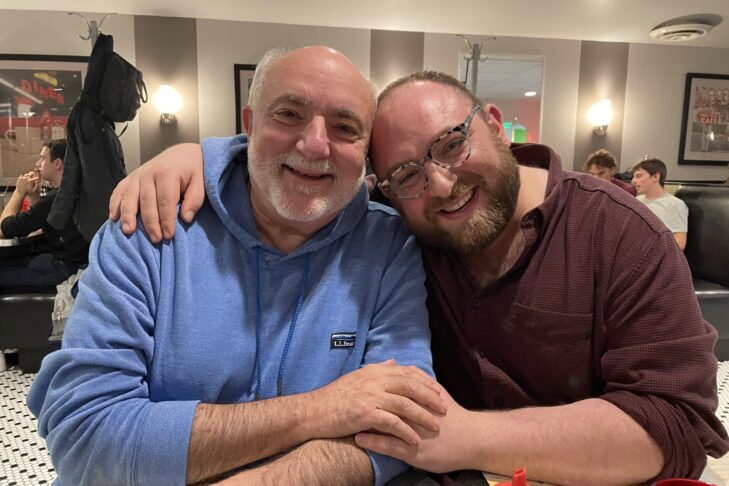Last week, I traveled from Salzburg, Austria—where I am spending much of my fall sabbatical—to Israel. I did so to celebrate the first days of Hanukkah with my brother and his family and to see friends, colleagues, and students. Making this trip became an urgent priority after the Oct. 7 terror attack by Hamas and the ensuing war. While seemingly impossible, my experience in Israel became more emotionally fraught when I was told of the unexpected passing of my beloved mentor, Rabbi Dr. David Ellenson (may his memory be for a blessing).
Having just completed meetings with colleagues at the Shalom Hartman Institute in Jerusalem, I was walking down Tel Hai Street (where I lived as a graduate student 25 years ago), when my wife, Dr. Judith Rosenbaum, called me. I clicked on the video option and saw that she was making the call with Rafi Ellenson, David’s son, a Hebrew College rabbinical student, and a ben bayit, a member of our extended household. Both Judith and Rafi had tears in their eyes as she told me in a gentle voice that David had died a few hours earlier. I was in utter shock and began to sob uncontrollably. While we knew that David had a heart condition, no one expected that it would take his life anytime soon.
After speaking briefly with Judith and Rafi, I wandered the familiar streets of the German Colony for the next hour or so, crying, recollecting, and trying to come to grips with the fact that David was gone. How could it be?
David emailed me just last Tuesday after reading a brief article about my recent trip to Leipzig, Germany—the home of much of my mother’s family before the Shoah—where I gave two lectures at the university. A distinguished scholar of German Jewish intellectual history (among other subjects), he expressed pride in the fact that I made the journey and spoke about rabbis Abraham Joshua Heschel and Zalman Schachter-Shalomi, two outstanding Neo-Hasidic figures, who were formed, in part, by German culture, before both escaping the Nazi onslaught. And, as he did in every conversation we had over the last 17 years, David asked me about my children—who refer to him as “Uncle David.”
My kids became particularly close with David when he lived with us for part of every week for three years during his tenure as a professor and director of the Schusterman Center for Israel Studies of Brandeis University. For my children, the highlight of the week were their breakfasts with our beloved house guest. Knowing that as twins Ma’ayan and Aviv craved individual time and attention, he would take each of them separately to In a Pickle, their (and his) favorite local diner for pancakes or waffles, topped with whipped cream and chocolate sauce, reminding them that they also needed to add some fresh fruit to their orders (!). Every week, the twins would negotiate who would go to breakfast with Uncle David on Tuesday and who on Wednesday.
Last Friday morning, Rafi shared with us that he was going to take a shmirah (“guarding,” sitting with the deceased between death and burial) shift, wanting to spend some quiet time with his father before moving into Shabbat. In response, my son (now 17 and a rough-and-tumble hockey player) sent Rafi a text message from Europe, asking his adopted cousin to share a message with Uncle David. The heart of his message—which has been echoed in dozens of public tributes—was that while this man will rightly be remembered for his outstanding achievements as an academic and religious leader, it was his kindheartedness that truly made him special. As Aviv put it, “Uncle David was a giver,” who gifted countless people with his caring presence.
In reading my son’s text message, listening to and reading various obituaries, and reflecting on my own experiences with David, the following brief Hasidic story came to mind and heart: Rabbi Abraham Joshua Heschel of Apt (d. 1825, namesake of the 20th-century Abraham Joshua Heschel) was renowned for the efficacy of his prayers. As a result, a group of his Hasidic colleagues came to him wanting to learn the secret of his success. Did he use magical incantations or other esoteric techniques? In response, the Apter stated that he believed that his success at prayer was attributable to a simple, interpersonal ritual he carried out daily. Every morning he arrived early to his synagogue, where he stood in the courtyard waiting to welcome community members. As each person approached, the Rebbe (“Master”) had a brief word with them. If an individual was experiencing any pain or sorrow, he attempted to lessen their burden by placing some of it on his own heart. When it came time for the Apter to lead his community in prayer, the Divine looked upon this broken-hearted spiritual leader and felt compelled (as Ha’Rahaman, “The Compassionate One”) to show him mercy.
It is no wonder that the Rebbe of Apt is also known throughout the Hasidic world as the Ohev Yisroel (“The Lover of the People of Israel”).
Rabbi Dr. David Ellenson—Uncle David—was also a lover of Israel and of humanity. Throughout his life, he sought to comfort, support, and encourage others. It was, as my son said, his “super-power.” When David’s heart gave out last week, I know that it was full to the brim with empathy. May the memory of this compassionate one inspire us to act with greater care for all others.
Rabbi Or Rose is the director of the Miller Center for Interreligious Learning & Leadership of Hebrew College in Newton, MA.
This post has been contributed by a third party. The opinions, facts and any media content are presented solely by the author, and JewishBoston assumes no responsibility for them. Want to add your voice to the conversation? Publish your own post here. MORE


